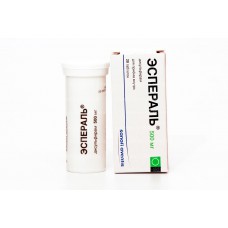Expiration date: 01/2026
Active substance
disulfiram (disulfiram)
Product form, composition and packaging
Tablets are white with a cream tint, round, with the engraving "ESPERAL" on one side and a cross-shaped risque on the other.
1 tablet contains:
disulfiram 500 mg
Excipients: polyvidon K30, sodium carmellose, magnesium stearate, microcrystalline cellulose.
20 PCs. - polypropylene bottles, sealed with a cork with a moisture absorber and control of the first opening (1) - cardboard bundles.
Clinical and pharmacological group
Aldehyde dehydrogenase inhibitors
Pharmaco-therapeutic group
Drug for the treatment of alcohol dependence
Indications
- treatment and prevention of relapses of chronic alcoholism.
Additionally, the drug is used as a detoxifying agent for chronic Nickel poisoning.
Dosage regimen
Before starting treatment, the patient should be carefully examined and warned about the consequences and complications.
The drug is prescribed inside 500 mg 1 time/day in the morning during meals according to an individual scheme, gradually reducing the dose to 250 mg (1/2 tablet) or 125 mg (1/4 tablet) per day. Depending on the patient's response to treatment, the dose can be increased or decreased.
After 7-10 days, a teturam-alcohol test is performed: 20-30 ml of 40% ethanol (vodka) after taking the drug at a dose of 500 mg; with a weak reaction, the alcohol dose is increased by 10-20 ml (the maximum dose of vodka is 100-120 ml). The test is repeated 1-2 days later in the hospital and 3-5 days later on an outpatient basis, with correction of doses of alcohol and / or the drug, if necessary. In the future, the drug can be used in a maintenance dose of 150-200 mg/day for 1-3 years.
Side effect
Due to the properties of disulfiram: metallic taste in the mouth, unpleasant smell in patients with colostomy (associated with carbon sulfide); rarely - hepatitis, sometimes occurring in patients with Nickel eczema, not suffering from alcoholism, polyneuritis of the lower extremities, optic neuritis, memory loss, confusion, asthenia, headaches, skin allergic reactions.
Associated with the combination of disulfiram-ethanol: described cases of respiratory failure, collapse, heart rhythm disorders or acute angina, sometimes myocardial infarction, as well as neurological disorders, brain edema.
Complications with long-term use: psychoses resembling alcohol, hepatitis, gastritis; in patients with cardiovascular diseases, brain vascular thrombosis is possible, so if you complain of paresthesia in the limbs and face, you should immediately cancel the drug; exacerbation of polyneuritis.
When taking doses of alcohol over 50-80 ml (in terms of 40% ethanol) against the background of taking the drug, severe disorders of the cardiovascular and respiratory systems, edema, convulsions develop. In this case, detoxification therapy is urgently performed, analeptics are administered, and symptomatic treatment is performed.
Contraindications to use
Absolute:
- severe liver failure;
- diabetes;
- epilepsy and convulsive syndrome of any origin;
- mental illness;
- pregnancy;
- lactation;
- hypersensitivity to the components of the drug.
Relative:
- kidney failure;
- hypothyroidism.
Special instruction
During the period of treatment should avoid drinking alcoholic drinks and medicines, containing ethanol.
Overdose
Symptoms: the combination of disulfiram-ethanol causes depression of consciousness up to coma, cardiovascular collapse, neurological complications.
Treatment: symptomatic therapy.
Drug interaction
Combinations are contraindicated
When taking Esperal ® and ethanol simultaneously, an intolerance reaction develops (blood flushes, erythema, vomiting, tachycardia).
Combinations are not recommended
When used simultaneously with isoniazid-violations of behavior and coordination.
When used simultaneously with 5-nitroimidazole derivatives (metronidazole, Ornidazole, secnidazole, tinidazole), delirious disorders and confusion develop.
When used simultaneously with phenytoin, there is a significant and rapid increase in the concentration of phenytoin in blood plasma with the development of toxic symptoms (due to inhibition of phenytoin metabolism). If the combination cannot be avoided, then clinical observation and monitoring of plasma phenytoin concentrations should be performed during and after treatment with disulfiram.
Combinations that require caution
When used simultaneously with warfarin (and other oral anticoagulants), its effect increases and the risk of bleeding increases (due to inhibition of warfarin metabolism in the liver). With this combination, it is recommended to monitor the level of prothrombin in the blood more frequently and adjust the dose of anticoagulants within 8 days after discontinuation of disulfiram.
Disulfiram inhibits metabolism of theophylline. Therefore, it is necessary to reduce the dose of theophylline, depending on the clinical symptoms and its concentration in plasma.
Disulfiram can enhance the sedative effect of benzodiazepines due to inhibition of their oxidative metabolism (especially chlordiazepoxide and diazepam). Doses of benzodiazepines should be adjusted according to clinical manifestations.
Tricyclic antidepressants increase alcohol intolerance reactions if patients treated with disulfiram take alcoholic beverages.
Conditions of release from pharmacies
The drug is available on prescription.
Storage terms and conditions
List B. the Drug should be stored in a dry, inaccessible place for children at a temperature below 25°C. Shelf life-3 years.
Diseases
Chronic alcoholism


